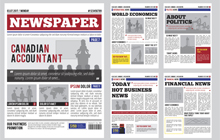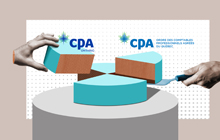CPA Standoff: Ontario government sticks to sidelines in governance dispute

In the dispute between provincial and national accounting bodies, politicians say CPA Ontario's regulatory legislation is unaffected by key disagreements in the rift
Note: This is the first article in a five-part series.
OTTAWA, September 22, 2023 – The decision by CPA Ontario and CPA Quebec to terminate their present agreement with CPA Canada under the Collaboration Accord has sent shockwaves through the Canadian accounting profession.
“Being one unified profession has never been more important and never been more at risk,” said Richard Olfert, FCPA, FCA, chair of the board for CPA Canada, speaking at a member information session prior to the One National Conference 2023 in Halifax.
“It’s been 10 years since the unification of the profession. During that time, we have achieved so much together. We cannot take those achievements for granted or allow the principles that led to unification to be cast aside. There is too much at stake,” he added.
Carol Wilding, FCPA, FCA, president and CEO of CPA Ontario in Toronto, said the decision to provide the required 18-month notice to conclude the current arrangement in December 2024, was a difficult one.
“It was always Ontario’s goal to find a path forward. We’ve been discussing potential changes to our working relationship with CPA Canada and our provincial counterparts for more than five years. In the months working up to the decision there were very detailed proposals put forward,” said Wilding.
Multiple issues on the table
The Collaboration Accord that CPA Canada and the provinces signed to work together in 2016, following unification of the legacy bodies a few years earlier, established that there would be a compulsory review after two years. That started in 2018 but, despite an ongoing review, discussions, and deliberations over the past five years, “we were just simply too far apart with Canada on some of the fundamental issues,” said Wilding.
CPA Ontario was looking for three core principles that it believed were fundamental to the effective governance of the profession and how it operates, given its oversight role and responsibility in Ontario. Those were: strengthened oversight of the profession by the provincial and territorial bodies; an effective governance structure of CPA Canada that respected that oversight; and increased financial transparency and accountability, she elaborated.
Geneviève Mottard, CPA, CA, president and CEO of the Quebec CPA Order in Montreal, outlined four core principles her organization was seeking.
The first three consistent were consistent with Ontario, including a recognition that oversight of the profession rests with the provinces and territories; governance changes to allow that oversight; and increased financial transparency from CPA Canada regarding the funds remitted to it.
The fourth requirement was a governance framework that allows Quebec, which has specific provincial legislation it must follow, to collaborate nationally but in a way that never deviates from that provincial legislation.
“If those four principles are respected, our objective has always been to find a new way to collaborate,” said Mottard.
Olfert said CPA Canada had discussions with CPA Ontario and the Quebec CPA Order on the three main ideas that both bodies sought — regarding oversight of the profession, governance, and full financial transparency on CPA Canada’s operations. He said CPA Canada agreed to work with those principles provided there was consultation with both the other professional and territorial bodies (PTB), and then ultimately individual CPAs on some of those ideas.
“In those conversations, CPA Canada also focused on three additional ideas, or principles. First, there must be a commitment to act nationally as a profession. Second there could be no path to control or to veto for one or two provinces. Finally, we believed that CPA Canada’s role in the whole CPA ecosystem must be defined,” added Olfert.
That did not lead to an agreement on how to put all of those principles together, so CPA Canada started further conversations by taking those discussions to the PTBs, and those were ongoing when the withdrawal notices were sent by Ontario and Quebec, said Olfert.
“Fundamental differences of opinion exist with CPA Canada, and we reached a stalemate,” said Wilding.
“Our Council could not let the status quo continue. So, they took the difficult decision to withdraw from the existing agreement so that we could create a future way of working together that is fit for the profession going forward — one that enables us to best deliver our legislated mandate, protect the public and advance the profession here in Ontario,” she added.
The regulatory role of CPA Ontario
CPA Ontario’s mandate will not change if it cannot renegotiate a new Accord with CPA Canada, said Carol Wilding, FCPA, FCA, president and CEO of CPA Ontario.
The legislated mandate of CPA Ontario, under the Chartered Professional Accountants of Ontario Act, 2017, is to protect the public interest. The Act also addresses other roles for CPA Ontario, including promoting the welfare and trust of the accounting profession, said Wilding.
CPA Ontario is solely responsible for overseeing CPAs and accounting firms in Ontario, awarding the designation to members, managing their education, providing inter-provincial and international mobility, as well as ongoing professional development for its members, she said.
Maher Abdurahman, media spokesperson for the Ontario Ministry of the Attorney General, also referenced The Chartered Professional Accountants of Ontario Act, noting that it established the legal framework for CPA Ontario and its governing council to regulate provincial CPAs in the public interest.
“The Ministry undertakes law reform when the need arises based on a number of factors including stakeholder feedback,” he said. But with respect to the current situation between CPA Ontario and CPA Canada, “It is premature to comment further until discussions are resolved,” Abdurahman added.
Stephanie Bowman, FCPA, FCA, is the Ontario Member of Provincial Parliament for Don Valley West, and serves as the Ontario Liberal Party critic for Finance; Infrastructure; and Agriculture, Food and Rural Affairs. She is also a member of the independent Accounting Standards Oversight Council, which oversees the Accounting Standards Board and the Public Sector Accounting Board.
Emphasizing that she was speaking from her position as an MPP, not as a spokesperson for any of the accounting bodies, Bowman said that even if CPA Ontario and CPA Canada fail to agree on a new Collaboration Accord, she is not concerned that CPA Ontario’s mandate to licence members and regulate the profession will be threatened.
That is because of the protections to the public contained in the Chartered Professional Accountants of Ontario Act, 2017, which remain unaffected, she said.
“People, including users of financial statements, can be assured that the standards for CPAs in Ontario will remain solid and firm. There isn’t a risk to the public in terms of making sure that the markets have qualified professional accountants who are issuing opinions on financial statements,” she elaborated.
Bowman does not believe the Ontario government needs to be doing anything during the current 18 month renegotiation phase other than monitoring the situation to remain apprised of what is happening.
Unless there are changes to the Chartered Professional Accountants of Ontario Act, “then I think we can be satisfied that things are well in hand,” said Bowman.
Jeff Buckstein, CPA, CGA, is a freelance business journalist in Ottawa. Title image: iStock composite. Read the entire CPA Standoff series:
Part One: CPA standoff: Ontario government sticks to sidelines in governance dispute.
Part Two: CPA Standoff: Financial transparency a key issue in national accounting rift
Part Three: CPA Standoff: Unique regulatory status of CPA Quebec complicates accounting rift
Part Four: CPA Standoff: Accountants question the motives behind national accounting rift
Part Five: CPA Standoff: Why haven’t the other provincial bodies joined the accounting rift?










(0) Comments